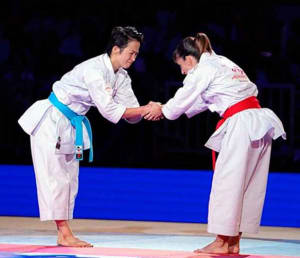
Essential guidance from the Senjokai coaching team to help you make the best decision for your child's karate journey
One of the most important decisions you'll make as a karate parent is how often your child should train. At Senjokai, we welcome students regardless of their training frequency, but after years of coaching hundreds of children, we've observed clear patterns that we believe parents should understand before making this choice.
This isn't about pressuring families into more sessions - it's about giving you honest, supportive guidance so you can make the best decision for your child's success and enjoyment.
The Reality We've Observed
From our coaching team's experience: Training frequency significantly impacts not just skill development, but also your child's overall karate experience, friendships within the dojo, and long-term commitment to their martial arts journey.
We've watched children thrive in different scenarios, but we've also seen predictable challenges that arise with different training frequencies. Our goal is to help you understand these patterns so you can set your child up for success.
Once-Per-Week Training: The Starting Point
What Works Well:
- Perfect introduction to karate for hesitant children
- Manageable commitment for busy family schedules
- Cost-effective way to explore martial arts
- Still develops character, discipline, and basic skills
- Valuable community membership with access to all events and activities
The Challenges We've Noticed:
- Slower skill development - particularly around yellow belt level
- Technique retention can be difficult between sessions
- Weaker dojo friendships - less time to bond with training partners
- Higher dropout rates - especially around yellow belt progression (typically 6-12 months)
- Tag grades often needed to maintain motivation and progress
- Limited competition preparation - insufficient training time for competitive success
The Brown Belt Reality Check:
Important for parents to understand: When once-per-week students reach brown belt level, we require increased training commitment to progress toward black belt. This isn't to exclude anyone - it's based on the reality that black belt responsibility requires intensive preparation that once-per-week training cannot provide.
What this means: Once-per-week students can absolutely enjoy a fulfilling karate journey through the coloured belt system, but black belt progression requires enhanced commitment.
Twice-Per-Week Training: The Foundation for Success
What We've Observed:
- More confident progression through all belt levels
- Better technique retention and skill development
- Stronger friendships within the dojo community
- Higher success rates at gradings
- No tag grades typically needed - students develop more consistently
- Competition opportunities become realistic and achievable
- Leadership development happens more naturally
- Black belt progression remains achievable
- Students typically stay 4+ years compared to once-per-week dropout rates
The Commitment Reality:
- More time investment from families
- Higher financial commitment
- Requires more scheduling coordination
- Greater expectation for consistent attendance
Three Hours Plus Per Week: The Path to Excellence
For Our Most Dedicated Students:
This is where we see the most dramatic results and where students truly excel in both traditional and sport karate.
What "Three Hours Plus" Looks Like:
- Three regular classes per week (minimum)
- Squad training sessions for advanced students
- Competition preparation sessions
- Special seminars and workshops
- Leadership development opportunities
The Superior Results We See:
- Approximately 4-year timeline to black belt
- Exceptional technique development and retention
- Advanced coaching in both traditional JKS and sport WKF karate
- Competition success at regional, national, and international levels
- Natural leadership abilities and teaching development
- Access to exclusive opportunities - Japan trips, visiting sensei, special training camps
- Character development that extends far beyond the dojo
- Preparation for lifelong martial arts journey
Teaching Both Traditional and Sport Karate:
At Senjokai, students training three hours plus per week have access to our complete curriculum:
- Traditional JKS Shotokan Karate builds character, discipline, and authentic martial arts skills
- Sport WKF karate develops competitive skills, fitness, and tournament success
- Combined approach creates exceptionally well-rounded martial artists
- Squad training provides elite-level instruction and preparation
- Competition pathways from local to international levels
The Tag System: Supporting Lower-Frequency Students
Our solution for individual development: For ages 7-12, we offer tag grades (Red, Orange, Yellow, and Green belts with white stripes) to support students who need more time to develop certain skills.
What parents should know:
- Not a consolation prize - tag grades represent genuine achievement
- Maintains motivation during challenging periods
- Recognises progress whilst maintaining our high standards
- Many current black belts started with tag grades
- Builds character through learning that persistence pays off
Making the Right Choice for Your Family
Consider Once-Per-Week If:
- Your child is just starting and you want to test their interest
- Family schedules are extremely busy
- Budget is a primary concern
- Your child is very young (4-6 years old)
- You're looking for character development and fun rather than progression focus
Consider Twice-Per-Week If:
- Your child shows genuine enthusiasm for karate
- You want steady progression through the belt system
- Black belt achievement is a long-term goal
- You value stronger community connections
- Your child responds well to regular structure and routine
Consider Three Hours Plus Per Week If:
- Your child is passionate about karate and shows natural ability
- Competition interests them or you want that option available
- You want accelerated development and leadership opportunities
- Your family can commit to the intensive schedule
- You're interested in the full traditional and sport karate experience
- You want your child to achieve their maximum potential
- You value the character development that comes with serious commitment
The Progression Reality: What to Expect
Once-Per-Week Timeline:
- Coloured belt progression: 7-10 years to reach brown belt
- Brown belt transition: Increased commitment required for black belt progression
- Tag grades: Often helpful for maintaining motivation
- Focus: Character development, basic skills, community membership
- Dropout risk: Higher around yellow belt level (6-12 months)
Twice-Per-Week Timeline:
- Red Belt to Junior Shodan: Approximately 4 years 10 months
- Consistent progression: No tag grades typically needed
- Black belt achievable: With proper commitment and effort
- Focus: Balanced skill development and character growth
- Retention: Students typically stay 4+ years
Three Hours Plus Per Week Timeline:
- Red Belt to Junior Shodan: Approximately 4 years
- Advanced opportunities: Competition, leadership, special training
- Exceptional development: Superior technique and character growth
- Focus: Excellence in both traditional and sport karate
- Retention: Highest retention rates and long-term commitment
Our Coaching Philosophy on Training Frequency
From our team's perspective: We believe in being honest and supportive rather than giving false hope. Every training frequency has value, but different frequencies lead to dramatically different outcomes.
What we've learned:
- Three hours plus per week produces the most confident, skilled, and well-rounded students
- Parental support matters more than natural ability
- Consistent attendance is more important than perfect technique
- Character development accelerates with increased training frequency
- Community involvement deepens with more dojo time
- Realistic expectations lead to happier families and more successful students
The Benefits of Higher Training Frequency
Physical Development:
- Superior technique development and muscle memory
- Better fitness and coordination
- Injury prevention through proper conditioning
- Enhanced flexibility and strength
Mental Development:
- Improved focus and concentration
- Better stress management and emotional regulation
- Enhanced problem-solving abilities
- Increased mental resilience
Social Development:
- Stronger friendships within the dojo community
- Natural leadership opportunities
- Mentoring abilities with newer students
- Teamwork skills through squad training
Character Development:
- Deeper discipline and self-control
- Enhanced respect for others and themselves
- Greater perseverance through challenges
- Stronger work ethic that transfers to all areas of life
Supporting Your Decision
If You Choose Once-Per-Week:
- Embrace the journey - focus on character development and fun
- Attend community events - strengthen connections despite less training time
- Support home practice - help bridge the gap between sessions
- Celebrate progress - every achievement is meaningful
- Stay connected - communicate with coaches about your child's development
If You Choose Twice-Per-Week:
- Commit to consistency - regular attendance becomes more important
- Support their friendships - encourage connections with training partners
- Prepare for gradings - help them understand requirements and expectations
- Celebrate leadership - watch them develop teaching and mentoring skills
- Plan for progression - understand the long-term commitment to black belt
If You Choose Three Hours Plus Per Week:
- Embrace the transformation - this is a significant family commitment with exceptional results
- Support competition - be prepared for tournaments and training camps
- Encourage leadership - they'll become role models for other students
- Plan for opportunities - trips to Japan, special seminars, advanced training
- Celebrate excellence - they're on the path to becoming exceptional martial artists
- Prepare for lifestyle change - karate will become a central part of your family's life
The Investment Perspective
Time Investment:
- Once per week: 1 hour weekly commitment
- Twice per week: 2 hours weekly commitment
- Three hours plus: 3-5 hours weekly commitment
Return on Investment:
- Once per week: Character development, basic skills, community membership
- Twice per week: Solid progression, black belt potential, strong friendships
- Three hours plus: Exceptional development, competition success, leadership skills, lifelong benefits
Questions to Ask Yourself
Before making your decision, consider:
- What are your child's goals and interests?
- How committed is your family to supporting their karate journey?
- What can you realistically commit to long-term?
- How important is maximising your child's potential?
- Does your child show signs of wanting more intensive training?
- Are you prepared for the lifestyle that comes with serious martial arts training?
Our Promise to You
Regardless of your choice: We're committed to helping your child succeed and enjoy their karate journey. However, we want you to understand that three hours plus per week produces dramatically superior results in every aspect of development.
Our commitment:
- Quality instruction at every session
- Individual attention regardless of class size
- Community inclusion in all events and activities
- Honest feedback about progress and development
- Flexible support as your family's needs change
- Maximum development opportunities for dedicated students
The Bottom Line: Frequency Matters
From our coaching team: While we value every student regardless of training frequency, we've seen that three hours plus per week creates the most confident, skilled, and successful martial artists. This isn't about elitism - it's about maximising your child's potential and giving them the best possible karate experience.
What matters most:
- Your child's commitment and enthusiasm
- Family support and realistic expectations
- Consistent attendance at whatever frequency you choose
- Understanding that more training produces better results
- Connection to our community and values
Ready to Begin?
The most important step is starting. Whether you choose once per week or three hours plus, your child will benefit from the discipline, confidence, and character development that traditional karate provides.
Remember: You can always increase training frequency as your child develops and your family's circumstances change. Many of our most successful students started with lower frequency and gradually increased their commitment as their passion grew.
The journey of a thousand miles begins with a single step - but the speed and quality of that journey depends on how often you take those steps.
Ready to Start Your Child's Karate Journey?
Contact Senjokai Karate Academy today:
📞 Phone: 077 8675 5535
📧 Email: senjokaikarate@gmail.com
📍 Address: 9 Standalane, Unit 1, Stewarton, Ayrshire KA3 5BG
🌐 Website: www.senjokaikarate.co.uk
Try our FREE 2-week introductory classes - experience our teaching style and community before making any long-term commitment.
Published by Senjokai Karate Academy | Traditional JKS Shotokan & Sport WKF Karate | Serving Ayrshire and Beyond
